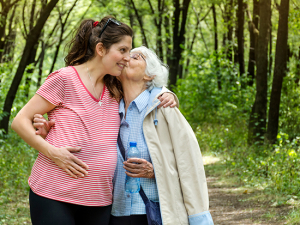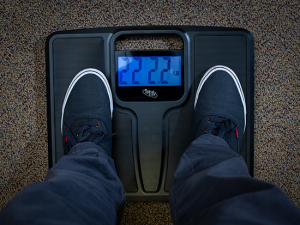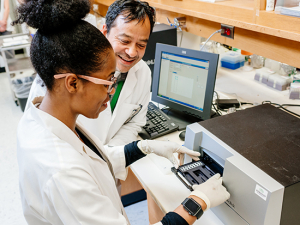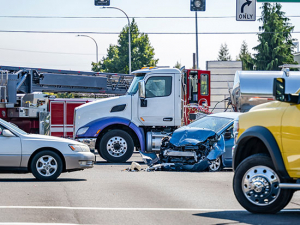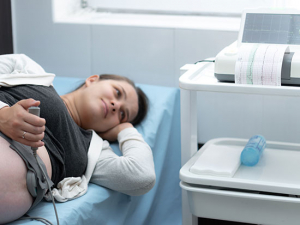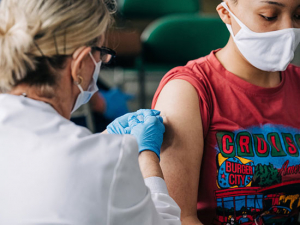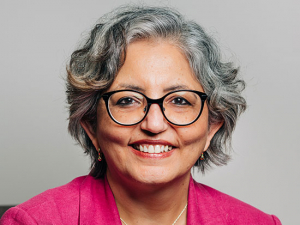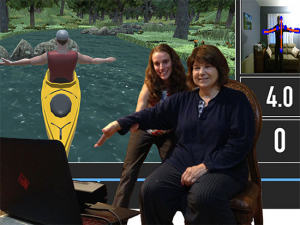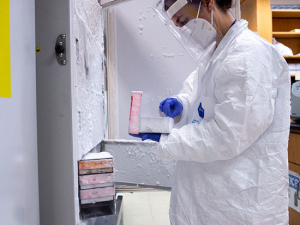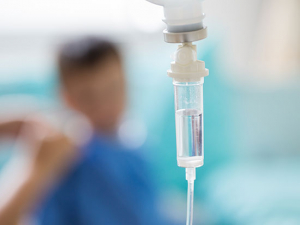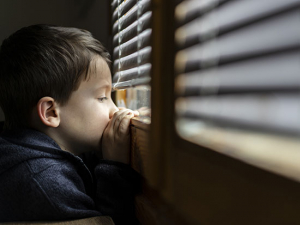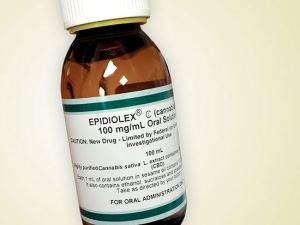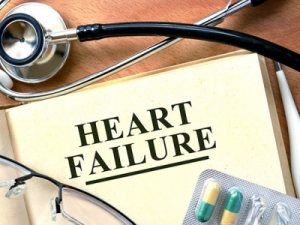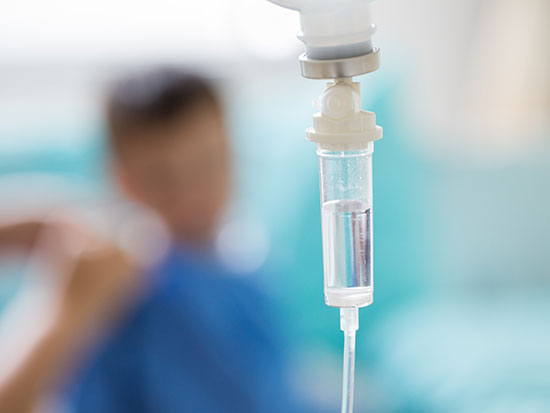 How do children with cancer fare after they are diagnosed with COVID-19? A new study based on data from nearly 100 institutions nationwide found that these patients are at high risk for severe COVID-19 and having their cancer treatment interrupted.A new paper in the Journal of Clinical Oncology shares findings from the largest registry of United States children with cancer who were diagnosed with COVID-19. Based on records from 917 children being treated at 94 United States institutions, UAB researchers and colleagues found that “children with cancer and COVID-19 are at risk of having severe infection and having their cancer therapy modified” because of COVID infection, the authors write.
How do children with cancer fare after they are diagnosed with COVID-19? A new study based on data from nearly 100 institutions nationwide found that these patients are at high risk for severe COVID-19 and having their cancer treatment interrupted.A new paper in the Journal of Clinical Oncology shares findings from the largest registry of United States children with cancer who were diagnosed with COVID-19. Based on records from 917 children being treated at 94 United States institutions, UAB researchers and colleagues found that “children with cancer and COVID-19 are at risk of having severe infection and having their cancer therapy modified” because of COVID infection, the authors write.
- 31% of registry patients were admitted to the hospital
- 9% were admitted to the ICU
- 4% died
- Cancer therapy was changed in 44.9% of children
The researchers also found that the children with cancer most likely to get sick with COVID-19 are:
- patients age 11 or older
- patients with comorbidities (other health conditions)
- patients with neutropenia and/or hematologic malignancies
The data also showed that Hispanic children with cancer are more likely to be infected with SARS-CoV-2, the virus that causes COVID-19, than children of other ethnic backgrounds. Hispanic children also are more likely to have their cancer therapy modified because of infection, even though they do not appear to have a more severe course of illness.
“Critical information for decision-making”
“These findings provide critical information for decision-making among pediatric oncologists, including inpatient versus outpatient management of COVID-19, cancer therapy modifications, consideration of monoclonal antibody therapy and counseling families on infection risks in the setting of the SARS-CoV-2 pandemic,” the authors write in SARS-CoV-2 in Childhood Cancer in 2020: A Disease of Disparities, published Oct. 25, 2021, in the Journal of Clinical Oncology.
“One major point of this research is that kids with cancer and COVID can get sick — they can end up in the hospital and the ICU, and they can die,” said study first author Emily Johnston, M.D., assistant professor in the Division of Pediatric Hematology-Oncology at the UAB Marnix E. Heersink School of Medicine and the UAB Institute for Cancer Outcomes and Survivorship. (In addition to her medical degree, Johnson holds a master’s degree in health services research.) “Doing what we can to protect them from COVID is important, including vaccination and mask-wearing. Now that vaccinations are approved for children, we will be recommending them for our patients.”
“One major point of this research is that kids with cancer and COVID can get sick — they can end up in the hospital and the ICU, and they can die. Doing what we can to protect them from COVID is important, including vaccination and mask-wearing. Now that vaccinations are approved for children, we will be recommending them for our patients.”
— Emily Johnston, M.D.
In the early days of the COVID pandemic, many pediatric oncologists thought that children with cancer who were infected might actually fare better than their healthy peers due to their suppressed immune systems. Most just wanted data to help guide treatment decisions: Should kids with cancer be admitted to the hospital for observation if they were diagnosed with COVID-19? What were their colleagues doing about chemotherapy treatment schedules? Were certain cancer types associated with worse outcomes?
Answering the big questions
Like many people, these doctors turned to their colleagues on social media to share what they had learned. “Doctors in New York and New Jersey were discussing anecdotes of their experiences,” said Julie Wolfson, M.D., senior author of the paper and associate professor in the UAB Division of Pediatric Hematology-Oncology and Institute for Cancer Outcomes and Survivorship. (Wolfson also holds a master of science degree in health services research.) “So much of what we do as pediatric oncologists is related to how intense the treatment is. Intensity is related to outcomes, and it is ingrained in us to stick to those treatment plans.”
Across the United States, doctors wondered: How long should I wait to restart cancer treatment after a patient is diagnosed with COVID? “Everyone kept saying, ‘Someone should collect this data,’ and we decided that we would do it,” Wolfson said, speaking of a group that started with herself, Johnston and Jennifer Levine, M.D., at Weill Cornell Medicine in New York City. “UAB has a strong infectious diseases division, the university was prioritizing COVID studies, we both have extensive research experience, and our institutional review board is used to outcomes-related research, so it made sense to do this here.”
“Everyone kept saying, ‘Someone should collect this data,’ and we decided that we would do it. UAB has a strong infectious diseases division, the university was prioritizing COVID studies, we both have extensive research experience, and our institutional review board is used to outcomes-related research, so it made sense to do this here.”
— Julie Wolfson, M.D.
The researchers formed the Pediatric Oncology COVID-19 Case Report registry, or POCC, in order “to provide pediatric oncologists real-time information about the clinical course of COVID-19 in children with cancer,” as they explain in their paper. Since the paper was submitted for publication, the registry has grown to include more than 100 institutions and more than 1,300 patients.
Building the registry involved “a lot of blood, sweat and tears,” Wolfson said. “We sent emails to every Children’s Oncology Group program in the United States, everyone we had ever trained with, and posted to social media. We thought it was the right thing to do, to help the pediatric oncology community to take care of these kids.”
The registry had three main objectives:
- identifying which children with cancer are most likely to get COVID
- determining the clinical course of COVID-19 in children with cancer
- identifying factors associated with a severe course of COVID-19
“If a child with cancer comes to an appointment with RSV or paraflu, we know what to do” as pediatric oncologists, Wolfson said. “With COVID, no one had the data.”
Disparities in outcomes
The POCC registry data revealed that children age 11 or older and those with other health conditions, neutropenia and hematologic malignancies all had worse outcomes than the rest of the registry cohort. That information is important, for example, when a physician is deciding whether to admit a patient to the hospital for evaluation, or to order a monoclonal antibody treatment, Wolfson says.
Wolfson and Johnston, who both have experience working with registry-based research, were also interested in disparities in care and outcomes for children with cancer and COVID. “COVID has uncovered many structural disparities,” Johnston said. “The increased rates of COVID in Hispanic patients may reflect who is working essential jobs and living in multigenerational housing.” These results have helped inform her own practice, Johnston added: “They have helped me do more informed counseling of families and encourage them to take extra cautions around children with cancer.”
Next steps
The research was originally unfunded but has now received a grant from the Concern Foundation, a California-based nonprofit. In order to get answers as quickly as possible, the investigators did not collect identifying patient information, including dates of illness, home addresses and other data that would have required longer regulatory approval times at participating institutions. “We are now starting to add that time information and other data,” Wolfson said. “We’re actively looking at subgroups of patients already.”
“The other thing we want to explore is the system-level factors that helped some institutions to participate while other sites were not able to,” Johnston said. “We want to understand the differences between these two types of sites.”
In addition to Johnston and Wolfson, both of whom treat patients at Children’s of Alabama, authors of “SARS-CoV-2 in Childhood Cancer in 2020: A Disease of Disparities” are Isaac Martinez, Elizabeth S. Davis, Caroline Caudill, Joshua Richman, M.D., Ph.D., and Smita Bhatia, M.D., of UAB; Julienne Brackett, M.D., of Texas Children’s Hospital; David S. Dickens, M.D., of the University of Iowa; Alissa Kahn, M.D., of Saint Joseph’s University Medical Center; Carla Schwalm, M.D., of Bronson Methodist Hospital; Archana Sharma, D.O., of Rutgers Cancer Institute; Pratik A. Patel, M.D., of Emory University School of Medicine; and Jennifer M. Levine, M.D., of Weill Cornell Medicine.
